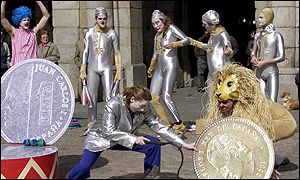| You are in: Business | |||||||||||||||||||||||||||||||||||||||||||||||||||||||||||||||||||||||||||||||||||||||||||||||||||||||||||||||||||||||||||||||||||||||||||||||||||||||||||||||||||||||||||||||||||||||||||||||||||||||||||||||||||||||||||||||||||||||
|
Thursday, 28 February, 2002, 23:29 GMT
Euro changeover complete

Spain bids farewell to the peseta on its last day as legal tender
Two months after it was introduced as a cash currency on 1 January 2002, the euro has finally become the sole legal tender in the 12 countries in the eurozone. France, Ireland, and the Netherlands abandoned their national currencies earlier this year, while the remaining nine countries said farewell to their national notes and coins as midnight struck on Thursday. Euro notes and coins have already received widespread acceptance by the 300 million citizens of the eurozone, with the vast bulk of transactions taking place using the new notes and coins by the end of the first week of January. Few ceremonies will mark the demise of the old currencies, although Italians are being encouraged to throw their old lire into the Trevi fountain. The rapid and smooth transition - and the successful logistical operation involving the transfer of billions of euro notes and coins to banks, retail stores, and vending machines - is a boost for the European Central Bank (ECB), which masterminded the operation. And it has given hope to those, like ECB president Wim Duisenberg, who see the euro as a broader symbol of the drive towards greater European economic and political integration. Fears unjustified The fact that fears of many euro sceptics - over counterfeiting, price inflation, and the cost and confusion of the changeover - were not realised, has also given heart to those who favour membership of the single currency in the three countries that are not members, the United Kingdom, Denmark, and Sweden.
However, the change has not been costless, with banks and stores bearing large one-off costs of converting their cash registers and accounting systems to the new currency. The cost to retailers alone has been estimated at 11bn euros (£6bn; $10bn), around 1% of their turnover. And consumer groups claimed that some retailers did round prices upwards, with inflation ticking up slightly in January - something that could also have been caused by a large amount of illicit cash re-entering the financial system. Europe is still some way from full price transparency between countries, where people can easily compare the price of their cars, washing machines, and telephone charges across the Continent. But as the new currency highlights the price differences that are due to different tax rates, it could create pressure for further tax harmonisation throughout the eurozone. Managing the euro However, the success of the eurozone will not be judged solely on the acceptance of the euro currency by the public. It also depends on how well the European Central Bank manages the eurozone economy, which is now facing its first real threat of recession since national currencies were first tied together in monetary union on 1 January 1999. Critics argue that the ECB has not cut interest rates fast enough or far enough to prevent Germany, the eurozone's largest economy, falling into a sharp downturn - mainly because other eurozone countries were growing faster, or facing an inflationary threat. And they argue that the rules agreed by eurozone countries to limit their budget deficits to no more than 3% of GDP are too restrictive, with more spending needed to help the recovery from the slowdown. The ECB is predicting a modest recovery by the second half of 2002, but rising unemployment - and the pain of unfinished structural reforms - could well unseat left-wing governments in France and Germany. Weak currency or strong? Even more galling to the euro's supporters has been its weakness on international currency markets, with the euro falling by 25% against the dollar since its launch 3 years ago.
This is in sharp contrast to the mandate of the central bank to maintain the internal value of the euro by limiting inflation to under 2%. However, the weak currency has brought some benefits, as cheaper exports from the eurozone have helped counter-act the economic slowdown. In the longer term, many economists say the value of the euro may rise back to parity with the dollar, but only if Europe completes the structural reforms that strengthen its productivity and reduce labour market inflexibilities. That is not something that the ECB itself can accomplish - although the EU as a whole is pledged to tackle the issue at the Barcelona summit next month. Now that the euro has become a reality, the real debates about the future of the European economy are about to begin. |
See also:
26 Feb 02 | Europe
26 Feb 02 | Europe
25 Feb 02 | Europe
Internet links:
The BBC is not responsible for the content of external internet sites Top Business stories now:
Links to more Business stories are at the foot of the page.
|
|||||||||||||||||||||||||||||||||||||||||||||||||||||||||||||||||||||||||||||||||||||||||||||||||||||||||||||||||||||||||||||||||||||||||||||||||||||||||||||||||||||||||||||||||||||||||||||||||||||||||||||||||||||||||||||||||||||
|
Links to more Business stories |
 |
||
| ----------------------------------------------------------------------------------
To BBC Sport>> | To BBC Weather>> | To BBC World Service>> ---------------------------------------------------------------------------------- © MMIII | News Sources | Privacy |